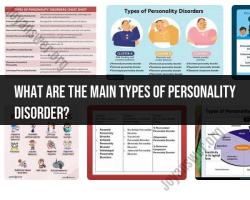What is a narcissistic sociopath and how to spot one?
The term "narcissistic sociopath" is not a formal psychiatric diagnosis. However, it is sometimes used informally to describe individuals who display traits of both narcissistic personality disorder (NPD) and antisocial personality disorder (ASPD), which is often referred to as sociopathy. These are serious personality disorders, and it's crucial to approach any attempts to identify them with caution. Diagnosing mental health conditions requires a comprehensive assessment by a qualified mental health professional.
That being said, here are some common traits associated with both narcissistic personality disorder and antisocial personality disorder that may contribute to the informal label "narcissistic sociopath." It's important to remember that having some of these traits does not necessarily mean someone has a personality disorder, and only a mental health professional can make an accurate diagnosis.
Traits Associated with Narcissistic Personality Disorder (NPD):
- Exaggerated Sense of Self-Importance: A person with NPD may have an inflated sense of their own importance and achievements.
- Preoccupation with Fantasies of Success, Power, or Beauty: Individuals may fantasize about unlimited success, power, beauty, or ideal love.
- Belief in Unique or Special Status: The person may believe they are unique and should associate only with other high-status or special individuals or institutions.
- Lack of Empathy: A lack of empathy and an inability to recognize or identify with the feelings and needs of others.
Traits Associated with Antisocial Personality Disorder (ASPD or Sociopathy):
- Disregard for Others' Rights: Individuals with ASPD may habitually violate the rights of others without remorse.
- Deceitfulness: Lying and deceit are common behaviors, often for personal gain or pleasure.
- Impulsivity: A lack of impulse control, leading to rash, irresponsible, or risky behavior.
- Aggression and Irritability: Frequent aggression, irritability, and hostility toward others.
Spotting a Person with Narcissistic or Sociopathic Traits:
- Manipulative Behavior: A person may manipulate others to achieve their own goals without regard for the impact on others.
- Charm and Charisma: Both narcissists and sociopaths can be charming and charismatic, particularly when trying to gain the trust or admiration of others.
- Superficial Relationships: Difficulty forming and maintaining deep, meaningful relationships, with interpersonal connections often being instrumental or transactional.
- Lack of Accountability: A persistent refusal to take responsibility for one's actions or the consequences of those actions.
- Pattern of Legal or Ethical Violations: Frequent involvement in activities that violate laws or ethical norms.
It's essential to emphasize that only mental health professionals can make a diagnosis, and the presence of these traits doesn't automatically mean someone has a personality disorder. Moreover, individuals can exhibit these traits to varying degrees without meeting the criteria for a formal diagnosis.
If you have concerns about someone's behavior or mental health, it's advisable to consult with a qualified mental health professional who can conduct a thorough assessment and provide appropriate guidance. Attempting to diagnose others without proper training can lead to misunderstandings and stigmatization.
How can one identify traits of a narcissistic sociopath, and what behaviors might indicate such characteristics?
Identifying traits of a narcissistic sociopath can be challenging, as they often exhibit a charming and charismatic facade. However, there are certain behaviors and patterns that may indicate these characteristics.
Narcissistic Traits:
Grandiose Sense of Self-Importance: They may exaggerate their achievements or talents and expect to be recognized as superior without commensurate achievements.
Deep Need for Admiration: They crave constant attention and praise, and they may become upset or angry when they don't receive the admiration they believe they deserve.
Lack of Empathy: They struggle to understand or care about the feelings of others, and they may exploit or manipulate others to achieve their own goals.
Entitlement: They believe they have special privileges and deserve special treatment, and they may become resentful or angry when they don't get what they want.
Arrogance: They have an inflated sense of their own importance and may look down on others.
Sociopathic Traits:
Callous and Unemotional: They lack empathy and remorse, and they may seem indifferent to the suffering of others.
Impulsive and Reckless: They may engage in risky or impulsive behaviors without considering the consequences.
Irresponsible: They may fail to meet their obligations or commitments, and they may have a pattern of irresponsible behavior.
Deceitful and Manipulative: They may lie or deceive others to get what they want, and they may use manipulative tactics to control others.
Overall, narcissistic sociopaths may exhibit a combination of these traits, making them difficult to identify. However, if you notice someone consistently demonstrating these behaviors, it may be a sign of a more serious personality disorder.
It is important to remember that not everyone who exhibits some of these traits is a narcissistic sociopath. Only a qualified mental health professional can diagnose a personality disorder.













